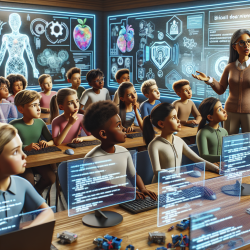Key Takeaways for Practitioners
1. Integrate Ethics into AI Education
Incorporating ethical considerations into AI education helps students understand the societal impacts of AI. Practitioners can design activities that highlight the ethical implications of AI technologies, such as the potential for bias in machine learning models. Encouraging students to reflect on these issues fosters critical thinking and responsible AI usage.
2. Emphasize Career Futures
Teaching students about the career implications of AI prepares them for the future workforce. Practitioners can introduce students to various AI-related careers and discuss how AI will shape different industries. This helps students see the relevance of AI in their future lives and motivates them to pursue further learning in the field.
3. Use Interactive and Hands-On Activities
Interactive activities, such as participatory simulations and hands-on projects, make learning about AI engaging and accessible. These activities help students grasp complex AI concepts by allowing them to experiment and observe AI processes in action. For example, the DAILy curriculum used activities like building decision trees and training supervised learning models to teach technical concepts.
4. Foster a Sociotechnical Perspective
Encouraging students to view AI as a sociotechnical system helps them understand the interplay between technology and society. This perspective is crucial for developing AI literacy, as it enables students to consider the broader implications of AI technologies. Practitioners can facilitate discussions that connect technical learning with societal issues, such as the ethical use of AI in different contexts.
5. Encourage Further Research
Practitioners should stay informed about the latest research in AI education to continually improve their teaching methods. Engaging in professional development opportunities and collaborating with other educators can provide valuable insights and resources for enhancing AI literacy education.
To read the original research paper, please follow this link: Integrating Ethics and Career Futures with Technical Learning to Promote AI Literacy for Middle School Students: An Exploratory Study.









